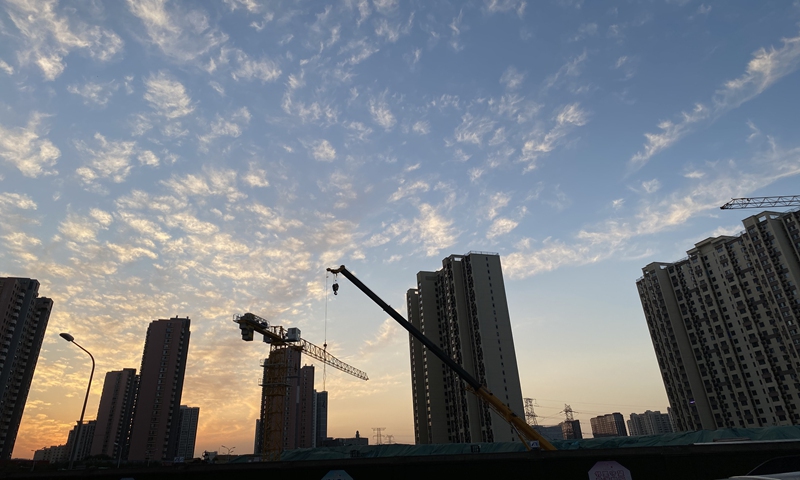
Cranes are seen at a construction site of a housing complex in Beijing. Photo: VCG
Some Chinese property companies will kick off the restructuring of their offshore debt, and some of them have made significant progress in onshore liability management.
Chinese experts noted on Tuesday that recent moves showed that developers have made breakthroughs in the disposal of debt, which will ease their liquidity pressure and boost confidence in the property sector.
Country Garden, a Chinese property development giant, announced on Tuesday that it hasn't yet made a due payment in the principal amount of HK$470 million ($ 60.1 million) on certain debts. It also said that it will not be able to meet all of its offshore payment obligations when due or within the relevant grace periods.
The company engaged China International Capital Corp Hong Kong Securities Ltd and Houlihan Lokey (China) Ltd as its joint financial advisors and Sidley Austin as its legal advisor, to evaluate the capital structure and liquidity of the group and formulate a holistic solution, which indicated that the company will kick off its offshore debt restructuring.
"This also indicated that Country Garden has moved to the process of disposing of offshore debt on top of the previous disposal of onshore debt," Yan Yuejin, a research director at Shanghai-based E-house China R&D Institute, told the Global Times on Tuesday.
In September, the group obtained consent from the relevant bondholders for the extension of maturity of nine series of onshore corporate bonds with an aggregate outstanding principal amount of about 14.7 billion yuan ($1.92 billion), which "provides the group with the time and space to focus on the recovery of its business operations," read the announcement.
Debt restructuring is a common way to dispose of debt. In the past two years, the real estate industry has experienced liquidity risks, and debt restructuring has become an important means for real estate companies to alleviate their financial pressure.
On September 15, Sino-Ocean Group said that it would undertake a comprehensive restructuring of its offshore debt. Three days later, Sunac China Holdings, another major developer, said that its offshore debt restructuring plan was approved by its shareholders.
"Debt restructuring can prevent companies from being involved in a downward spiral of the real estate market due to the outbreak of a debt crisis, buying some time for the real estate market to recover," Tian Yun, a Beijing-based economist, told the Global Times on Tuesday.
The biggest problem facing real estate companies now is offshore debt restructuring because of the different legal requirements and other factors. Therefore, if these companies are able to complete offshore debt restructuring, it will further ease their liquidity pressure, Tian noted.
Debt restructuring will also help these enterprises to focus more on ensuring the delivery of buildings, experts said.
As support policies are rolled out, the real estate market will certainly stabilize and rebound, and developers with projects in first- and second-tier cities will make debt repayments faster, Tian said.
According to data released by the China Real Estate Information Corp, the implementation of policies has help real estate sales recover. In September, the new housing turnover area of 30 key cities rose by 3 percent month-on-month, and that of the first-tier cities was up 16 percent.
Global Times

